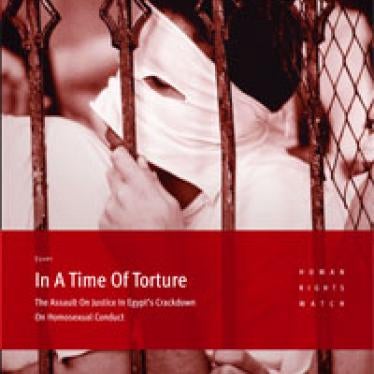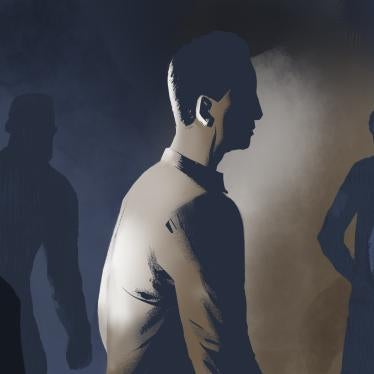We are 117 human rights organizations based in 41 countries around the world, working in the fields of health and human rights. We write you urgently to voice concern over the arrest and trial of men in Egypt for alleged homosexual conduct, apparently based on men’s suspected HIV serostatus. We are concerned that medical personnel may have been complicit, or actively participated, in acts violating the international norm prohibiting torture and other cruel, inhuman, or degrading treatment or punishment. We are further concerned that the Ministry’s involvement with the detention and interrogation of suspects in these cases condones or gives credit to myths about HIV/AIDS, in a way that is incompatible with the Ministry’s public health responsibilities and can only contribute to the epidemic’s spread.
We are profoundly disturbed by these arrests and by the destructive attitudes they display. We urge you, as custodians of public health in Egypt and as leaders in the national struggle against AIDS, to affirm in your statements and, more importantly, to embody in your actions the reality that respecting human rights is the way to protect health.
In the last four months, Cairo police have arrested at least twelve men in an apparent campaign against people whom authorities suspect of being HIV-positive.
This crackdown began in October 2007, when police stopped two men having an altercation in downtown Cairo. After one told the police he was HIV-positive, police arrested both of them, charged them with the “habitual practice of debauchery,” beat them and coerced them to sign confessions, and interrogated them to extract the names of contacts, thus beginning the ongoing wave of arrests.
Doctors employed by the Ministry of Health and Population subjected the men to HIV tests without their consent. Doctors from the Forensic Medical Authority forcibly subjected the men to intrusive, medically valueless, and abusive forensic anal examinations to “prove” they had engaged in homosexual conduct. All those testing positive for HIV were held in Cairo hospitals, chained to their beds, until February 25, when it appears that an order was given to remove their handcuffs. One man reports that a prosecutor informing him that he was HIV positive told him, “People like you should be burnt alive. You do not deserve to live.”
A Cairo court convicted four of these men on January 13, 2008 under Article 9(c) of Law 10/1961, which criminalizes the “habitual practice of debauchery [fujur]” – a term used to penalize consensual homosexual conduct in Egyptian law. According to defense attorneys, the prosecution based its case on the coerced and repudiated statements taken from the men, without providing witnesses or other credible evidence to support the charges, which all the men denied. On February 2, 2008, a Cairo appeals court upheld their one-year prison sentences. Five more men were indicted on March 4 and face trial on April 9. Charges were dropped against the remaining three.
It is evident from this case that the Ministry of Health and Population has failed both to protect the rights of patients under its care, and to help ensure police and criminal-justice authorities do not act on the basis of false information about HIV prevention and transmission.
We are grateful for the removal of chains from those kept in hospitals, as well as the dropping of charges against a small number of those arrested. However, we note that court files in the case initially contained a questionnaire from the Ministry of Health and Population, titled “A questionnaire for patients with HIV/AIDS.” It includes “yes” or “no” questions evidently used by doctors from the Ministry in this case to gather information from the men about whether they had sexual relations “with the other sex” or “with the same sex,” or “with one person” or “with more than one person.” Its inclusion suggests not only that private, patient information which should be confidential is shared with law enforcement, but that it may have been used by the prosecutors as evidence against the men. Information gained from patients should not be submitted in a criminal proceeding that itself violates human rights standards.
We recall that:
- International law forbids discrimination on the basis of real or perceived HIV serostatus. Detaining people on the basis of their declared HIV status and testing them without their consent for HIV infection violate the prohibition of discrimination and the right to bodily autonomy.
- As Human Rights Watch has documented in its research on Egypt, forensic anal examinations to detect “evidence” of homosexuality are medically spurious, and, conducted without consent under conditions of incarceration, constitute torture.
- Beatings and physical abuse of people in detention also violate international legal prohibitions of torture and other ill-treatment. The United Nations’ “Principles of Medical Ethics Relevant to the Role of Health Personnel, Particularly Physicians, in the Protection of Prisoners and Detainees Against Torture and Other Cruel, Inhuman, or Degrading Treatment or Punishment” state that it is a “gross contravention of medical ethics, as well as an offence under applicable international instruments, for health personnel, particularly physicians, to engage, actively or passively, in acts which constitute participation in, complicity in, incitement to or attempts to commit torture or other cruel, inhuman or degrading treatment or punishment.”
- Criminalizing consensual, adult same-sex sexual conduct violates Egypt’s obligations under international human rights law to respect and protect individual privacy and personal autonomy. The imprisonment of individuals for actual or alleged consensual same-sex relations between adults in private is a serious violation of human rights, and individuals held solely on that basis are victims of arbitrary detention who should be immediately and unconditionally released.
We urge you to:
- Support the setting aside of the convictions of four men already sentenced for the “habitual practice of debauchery,” and the immediate release and dropping of these charges against all others still facing trial.
- Seek a cessation of police and prosecutors conducting arbitrary arrests based on HIV status.
- Call for the repeal of Article 9(c) of Law 19/1961, the enforcement of which only drives groups vulnerable to the HIV/AIDS pandemic underground and beyond the reach of prevention or treatment.
- Ensure that personnel affiliated with the Ministry of Health and Population, or the National AIDS Program, neither condone nor participate in torture, ill-treatment, or criminal interrogations of detainees, and immediately report any instances of torture or ill-treatment to the appropriate authorities.
- End the practice of chaining detainees in need of medical attention to their hospital beds.
- End the practice of forcible HIV testing of detainees without full, informed consent. Ensure that all persons who test positive for HIV receive appropriate and immediate counseling as well as treatment.
- End the practice of forensic anal examinations for spurious traces of same-sex sexual conduct.
- Ensure that all detainees receive the highest available standard of medical care for any serious health conditions.
- Provide training to all criminal-justice officials on medical facts and international human rights standards in relation to HIV.
We look forward to your reply.
Sincerely,
Acción Solidaria
Caracas, Venezuela
Action Canada for Population and Development (ACPD)
Canada
African Council of AIDS Service Organizations (AfriCASO)
African Region
African Services Committee
United States
Agua Buena Human Rights Association
San Jose, Costa Rica
AIDES
France
AIDS and Rights Alliance for Southern Africa
African Region
AIDS Committee of Guelph/Wellington
Canada
AIDS Concern,
Hong Kong, China
AIDS Law Project
South Africa
AIDS Saint John
Canada
Aizhixing Institute
China
Aksion Plus
Albania
Alternative Law Foundation,
Bangalore, India
Alternatives – Cameroun
Cameroon
Al-Nadeem Center for the Psychological Rehabilitation of Victims of Violence Egypt
Amnesty International
United Kingdom/International
Arab Network for Human Rights Information
Egypt/Middle East Region
Arc En Ciel Plus
Cote d’Ivoire
ARDHO
Burundi
Asia Pacific Network of People Living with HIV/AIDS (APN+)
Asia Pacific Region
Spain
Associació de Voluntaris i Amics de l'Hospital (A.V.A.H.)
Association de Lutte Contre le Sida (ALCS)
Morocco
Association de Lutte Contre le Sida (ALS)
France
Association de Protection Contre le Sida (APCS), Oran
Algeria
Association for Women’s Rights in Development (AWID)
International
Association HIV.LV
Latvia
Association Ruban Rouge
Morocco
Brazilian Interdisciplinary Aids Association (ABIA)
Brazil
Budgetary and Human Rights Observatory
Egypt
C.A. Odyseus
Slovak Republic
The Canadian AIDS Treatment Information Exchange (CATIE)
Canada
Canadian HIV/AIDS Legal Network
Canada
Caribbean Vulnerable Communities Coalition
Caribbean Region
Centre for AIDS Rights (CAR)
Thailand
Centre for Human Rights
University of Pretoria
South Africa
Center for Reproductive Rights
United States/International
Center for Women’s Global Leadership
United States/International
China Orchid AIDS Project
China
Coalition for a Feminist Agenda
Australia
Coalition for Sexual and Bodily Rights in Muslim Societies (CSBR)
International
Coalition of Asia Pacific Regional Networks on HIV/AIDS (7 Sisters)
Asia Pacific Region
Colibri Cameroun
Cameroon
DAWN - Development Alternatives with Women for a New Era
Nigeria/International+
Doctors for Human Rights
United Kingdom/International
Donbas-Soc Project
Ukraine
Egyptian Initiative for Personal Rights
Egypt
ELSA Platform “Together, let’s fight AIDS in Africa”
France
Etablissement International Excellence
Cameroon
Eurasian Harm Reduction Network
Lithuania/Europe and Asia Regions
European AIDS Treatment Group
Belgium/Europe Region
François-Xavier Bagnoud Center for Health and Human Rights
Harvard University
United States
Fórum ONGs AIDS de Mato Grosso
Brazil
Fundación la Amistad-FUNAMI
Colombia
Fundación en Acción / Revista Indetectable
Colombia
Fundación Comunicación Positiva
Colombia
Fundación Seroestatus
Colombia
Global Network of People Living with HIV (GNP+)
International
Global Network of People living with HIV/AIDS - North America
North American Region
Global Rights: Partners for Justice
United States/International
Grupo de Trabajo sobre Tratamientos del VIH (gTt)
Spain
Health and Human Rights Programme
School of Public Health and Family Medicine, University of Cape Town
South Africa
Health GAP (Global Access Project)
United States/International
Hisham Mubarak Law Center
Egypt
"Hope" Club for Women Living with HIV/AIDS, Rostov-on-Don
Russia
Human Rights Watch
United States/International
International AIDS Society
Switzerland/International
International Council of AIDS Service Organizations (ICASO)
Canada/International
International Treatment Preparedness Coalition in Eastern Europe and Central Asia (ITPCru)
Russia/Europe and Asia Regions
Jamaica AIDS Support
Jamaica
International Commission of Jurists
Switzerland/International
Ipas: Protecting Women’s Health, Advancing Women’s Reproductive Rights
United States/International
The Italian Association for Women in Development (AIDOS)
Italy
Justice and Peace Commission, Durango
Mexico
Kamukunji Paralegal Network (KAPLEN KENYA)
Kenya
Lambda Istanbul Solidarity Association
Turkey
Katiró de Manaus/Amazonas
Brazil
Kenya AIDS Intervention Prevention Project Group (KAIPPG International)
United States/Kenya
Living Positively
Part of the Global Youth Coalition on HIV/AIDS
International
Medios y sida (Media & AIDS resource center)
Spain
Mouvement Francais pour le Planning Familial
France
Movimiento Mexicano de Ciudadanía Positiva
MSM: No Political Agenda (MSMNPA)
Trinidad and Tobago
MULABI
Argentina/Latin American Region
Naz Foundation International
India/United Kingdom
Network of People living with HIV/AIDS in Nigeria (NEPWHAN)
Nigeria
Pastoral Ecumenica VIH-SIDA
Argentina
Persia +
Iran
"Phoenix PLUS" Orel
Russia
Physicians for Human Rights
United States/International
PILIPINA Legal Resources Center
Philippines
Projeto Esperança - Apoio e Prevenção ás DST/HIV/Aids
Brazil
Provida
Colombia
Red Colombiana de Personas que Viven con VIHSIDA (RECOLVIH)
Colombia
Réseau sur l'Ethique, le Droit et le Sida (REDS)
Cameroon
Renaissance Santé Bouaké (RSB)
Cote d’Ivoire
Russian Harm Reduction Network
Russia
SASOD
Guyana
SERES
Portugal
Sexuality Information and Education Council of the U.S. (SIECUS)
United States
Sexuality Policy Watch
Brazil/United States
SIDACTION
France
Sida Info Service
France
"Socium” Mutual Help Group for People Living With HIV/AIDS
Rostov-on-Don
Russia
Solidarité Sida
France
Southern African Media and Gender Institute (SAMGI)
African Region
TARSHI (Talking About Reproductive and Sexual Health Issues)
India
Thai Aids Treatment Action Group
Thailand
Treatment Action Campaign (TAC)
South Africa
Tunisian Association Against STDs/AIDS
Tunisia
Unitarian Universalist United Nations Office
United States
United Belize Advocacy Movement
Belize
“Well-Being of Generations" NGO, Rostov-on-Don
Russia
Women for Women’s Human Rights – New Ways
Turkey
Women's Global Network for Reproductive Rights
International
World Organisation Against Torture (OMCT)
Switzerland/International
Youth Empowerment Foundation of Grenada
Grenada







